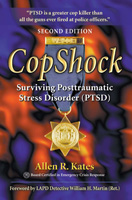
CopShock: Second Edition
Surviving Posttraumatic Stress Disorder (PTSD)
by Allen R. Kates, MFAW, BCECR
Critical Incidents and Intervention
A critical incident is an event so strong in emotional power that it rapidly breaks through police officers’ defenses. Against such force, their abilities to cope and respond are overwhelmed. The incident, like the murder of a child, could interfere with their functioning at a crime scene or even later at home. The event may make them feel numb, shocked and helpless. Officers may react with anxiety, inability to sleep, difficulty concentrating, fear, confusion, anger and depression.
Although these are normal reactions to abnormal situations, officers experiencing them may require an intervention, a way of telling what happened to a sympathetic listener trained in understanding the issues. An intervention is not therapy. It’s designed to assure the affected officers that what they feel is normal and that they will recover.
An intervention is not appropriate for every person. Officers with strong support systems in place may not need one. Interventions using health professionals may be met with mistrust, resistance and even anger. Police officers often, but not always, wish to be addressed by fellow officers.
Since intervention methods and techniques continue to evolve, perhaps the most practical way for police departments to assess stress intervention programs is to find out what works in other peer counseling units. For civilians, many companies have employee assistance units that can be just as effective.
International Critical Incident Stress Foundation
(ICISF)
The ICISF has
developed a comprehensive, systematic and multi-component approach to managing
emergency services stress including that of police officers. The program is
called Critical Incident Stress Management (CISM). CISM emphasizes pre-incident
stress education, but also highlights peer support programs during operations as
well as after their completion.
CISM also
provides defusings and Critical Incident Stress Debriefings (CISD) after
incidents. One-on-one support services and family interventions are part of the
CISM program.
The CISM
program is used in many law enforcement agencies in many countries around the
world. CISM seeks to prevent stress when possible, to intervene when stress
overwhelms and to guide people toward recovery whenever stress produces
damage.
Go to: http://www.icisf.org. Write: ICISF, 3290 Pine
Orchard Lane, Suite 106, Ellicott City, MD 21042. For emergencies, call:
410-313-2473. Phone: 410-750-9600.